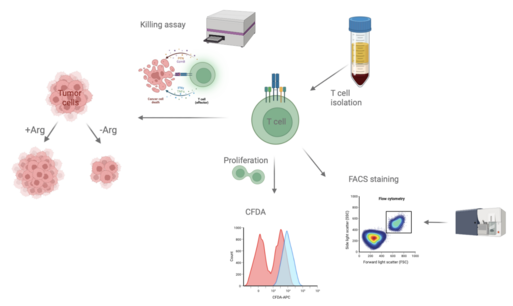Topic 11: Improving the fight against cancer - Arginine and its crucial role in tumor microenvironment
Supervisors:
Ann-Katrin Gebel, Anita Gabriele Kansy
AG Theobald/Munder, III Medical Department for Hematology and Oncology, University Medical Center Mainz
About AG Theobald/Munder:
Our immune system can recognize and destroy tumor cells. However, many tumors have the ability to evade this immune-mediated killing. The low effectiveness of immunotherapies is the result of these tumor-induced immune evasion mechanisms. Arginase is one of the important enzymes that contribute to the evasion mechanisms of the tumor. The working group of Prof. Munder conducts research in the field of immuno-oncology, with a focus on the potential of the “Arginase inhibition” strategy for cancer immunotherapy. On the other hand, Prof. Theobald's working group deals with adaptive immunotherapy and focuses on T cells and their optimization to better fight cancer. In close cooperation, we are seeking to reach an optimized and effective immunotherapy approach for cancer.
Interested? Here you can get deeper insights into our research projects:
III. Medizinische Klinik - Arbeitsgruppe Munder | AG Munder
III. Medizinische Klinik - Arbeitsgruppe Echchannaoui/Theobald
Project Description:
Our adaptive immune system is composed of many different types of cells including B and T lymphocytes. T lymphocytes (CD3+) play a very important role in the fight against cancer. However, T lymphocytes are not able to do their function if they are not provided with the supplements they need. One of the most critical agents for T cells to function is an amino acid named “Arginine”. Arginine plays an essential role in T cell proliferation and function. It has been shown that Arginine deprivation can cause the insufficient activation of T cells, decrease their cytokine production, and impair some metabolic pathways of T cells. Therefore, a lack of arginine can potently inhibit T cell-based immune response against cancer. There are many different cells in the tumor microenvironment that can produce Arginase, an enzyme that can degrade Arginine. In this condition, the T cell’s anti-tumor effects will be inhibited. Therefore, tumor cells can evade the immune responses, which leads to tumor progression.
Aim of the project:
In this project, we aim to assess the effects of Arginine deficiency in comparison to sufficient amounts of Arginine on both T cells and tumor cells. To this aim, researchers will investigate how the proliferation of T cells will be affected in the absence/presence of Arginine. In addition, researchers will get familiar with the concept of Arginine auxotrophic tumors, and how their function is influenced due to Arginine-starvation.
Methods:
- PBMC isolation, T cell purification
- Flow cytometry
- Proliferation Assay
- Tumor cell culture
- Luminescence-based viability assay
If desired by international pupils, the language of the research project in the laboratory may be English.
